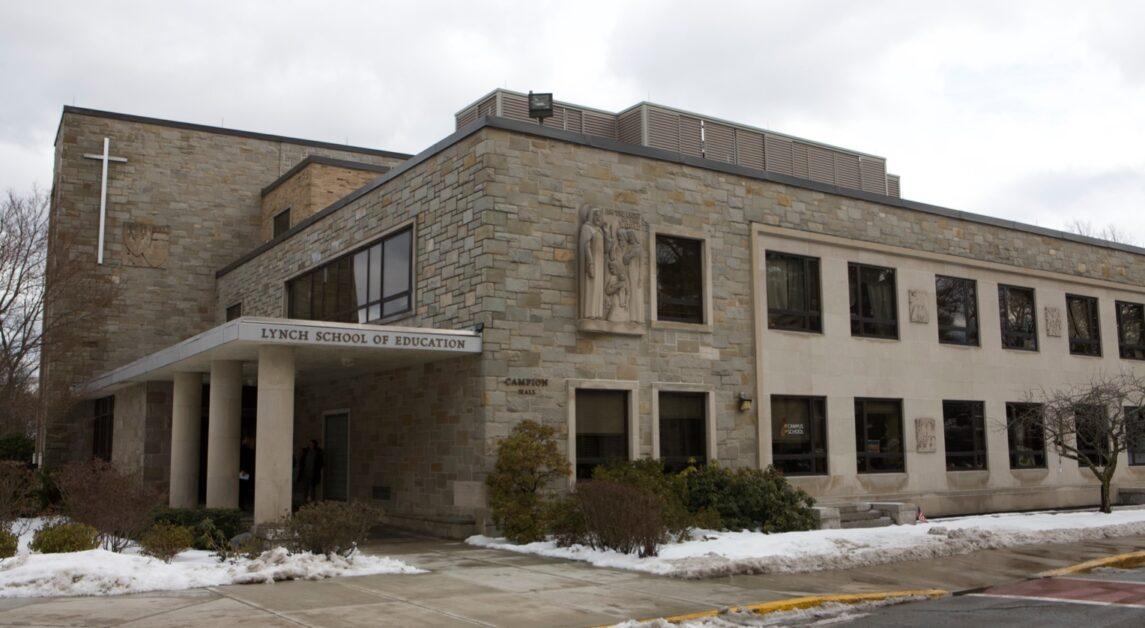Featured Image by Madison Sarka / Heights Archives
“I was deeply honored, but I was also entirely aware that the center is the result of the work of a large team of people,” Mary Walsh said of the center’s new name. “And so while my name is on it, it’s really the work of all of the team members in the center.”
The center began in 1996 as the Center for Child, Family, and Community Partnerships and was reestablished as the Center for Optimized Student Support in 2011.
It works to provide integrated student support to help children thrive in their academics and beyond, including through social development, physical health, and overcoming family challenges, according to Walsh, who is also the Daniel E. Kearns professor in the Lynch School of Education and Human Development.
Walsh was first inspired to start the center after she interviewed children for a book on the impact of homlessness on children, she said.
“It made such a profound impression on me, the challenges that these young children faced who were living in such extreme poverty, that I began to think about what society could do to support them … and it occurred to me that schools had so much to offer to support these children,” Walsh said.
She wanted to find out how schools could adapt and modify their existing structures to take care of the whole child—helping children with more than just their academics—and to connect children to enrichment opportunities in their communities.
“We needed a way for schools and community agencies to connect with one another, and in the process support families and children,” Walsh said.
Stanton Wortham, dean of the Lynch School, said that naming the center after Walsh is an appropriate tribute to her and her work to start and grow the center.
“Naming it for her is a wonderful thing,” Wortham said. “It’s a great tribute, but it’s also completely appropriate because she is the person—she envisioned it, she built it, she made it run, and she’s still managing it.”
Walsh said the donation will change the center in considerable ways and ensure that its work to support children will continue.
Wortham said the center currently focuses on three primary areas: intervention, research, and outreach.
“The center is running the intervention, it’s running the research, and then it does outreach to … contribute to the conversation among policymakers about this integrated student support model,” Wortham said.
One way the center accomplishes this is through City Connects—its flagship program which works with school counselors or social workers to develop tailored plans to support children.
Foley, who serves as the associate director of City Connects, said there are countless stories exemplifying the impact the program has had on children’s lives in school.
“Several years back, one of our coordinators noticed a child coming to school in bedroom slippers and it was winter, and … thanks to the City Connects database and our contacts with community partners, before the end of the school day the coordinator was able to secure not only winter boots, but some other winter gear that enabled that child to weather the Boston conditions much better coming to school,” she said.
BC’s City Connects program has expanded from Massachusetts to five states and now to Dublin, Ireland. According to Walsh, the work this program does is both efficient and cost effective.
“We had a study done by Columbia University showing the cost effectiveness of City Connects—that society is returned $3 for every dollar that the program costs, and that includes the cost of the service,” she said.
Wash said that the donation will allow programs like City Connects to flourish at the center.
“For one thing, it assures the sustainability of all work, and that to me is the most important thing,” she said. “With the center endowed, it ensures that the work of the center will go on.”
Eventually, Walsh said it will allow the center to expand and establish programs that address the whole child—helping children through emotional and physical development in addition to academics—but in the immediate, it will help them to make the program more accessible to children and even do more at the policy level nationally.
Wortham said the center and the City Connects program serve as an example of the Lynch school’s mission, to educate the whole person.
“City Connects is a paradigmatic example of that so it’s a whole person approach … this is part of our mission—part of the mission of Boston College and part of the mission of the Lynch School—is to try to help develop whole people who lead more purposeful lives,” Wortham said.
City Connects benefits from being part of the BC community and partnering with BC students, according to Foley.
“These students are our collaborators and have contributed enormously to what we’ve been able to do both in implementing interventions like City Connects, in sharing learnings more broadly, and also in the evaluation findings that have been able to demonstrate our effectiveness,” she said.



















